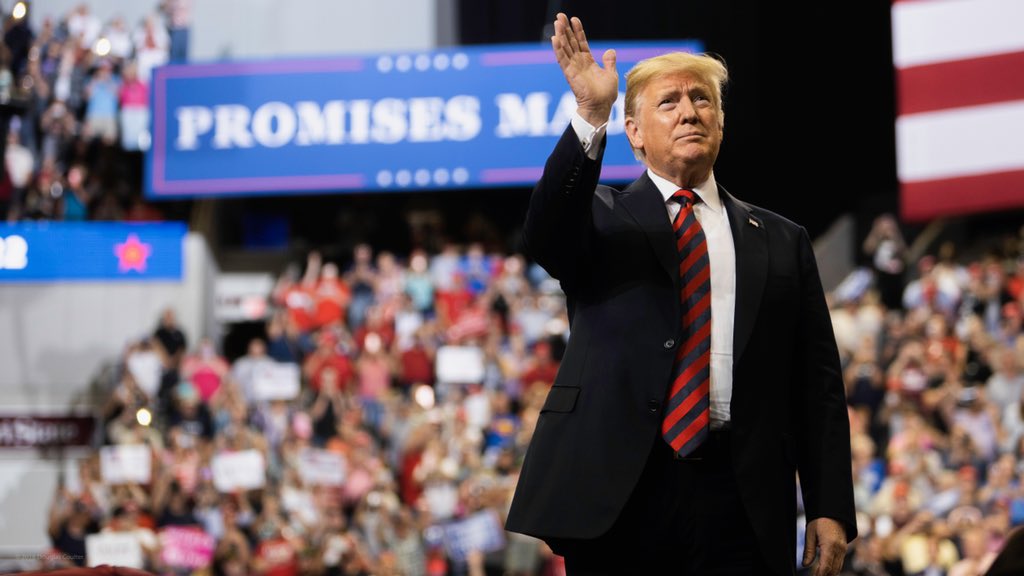
WASHINGTON — Mob rule. A socialist takeover. Terrorists marching on the U.S. border.
As President Donald Trump embraces the role of electoral boogeyman, he’s making closing arguments to midterm voters that increasingly resemble a Halloween horror story.
The candidate who won the White House in part by harnessing many Americans’ anxieties is offering dire warnings about what life would look like if Democrats gain control of Congress.
Using racially charged language and sometimes questionable information, Trump argues that Democrats will plunge the country into socialism, imperil the social safety net, raise taxes and welcome millions of people pouring into the U.S illegally.
“At stake in this election is whether we continue the extraordinary prosperity that we’ve all achieved, or whether we let the radical Democrat mob take a giant wrecking ball and destroy our country and our economy,” Trump said at a rally in Houston on Monday night. He’s warning of Democratic “mob rule” and predicting a stock market crash if Democrats retake control on Capitol Hill.
Trump’s doomsday predictions come as Republicans seek to counter months of rising Democratic enthusiasm. The GOP has seen its own increase in energy since the politically charged confirmation of Supreme Court Justice Brett Kavanaugh. Party leaders now believe they can increase their majority in the Senate, although control of the House remains within Democratic reach. Trump is looking to minimize any losses with a pitch that echoes his dark 2016 campaign rhetoric.
In a post-labour Day election briefing, GOP pollster Neil Newhouse warned the White House about an enthusiasm gap between Democrats and Republicans. He suggested that the GOP emphasize to voters the potential consequences of Democratic control of Congress on issues like abolishing U.S. Immigration and Customs Enforcement. Trump has taken that message to heart in recent weeks, White House aides say.
The scare tactics run the risk of motivating Democrats or turning off moderates in the suburban races that could decide the House majority. But the White House sees the fear factor as a winning strategy.
“We want to talk about national security, border enforcement and justices. It’s the themes and policy points that will drive people out,” said former Trump campaign aide Sam Nunberg. “These are stark choices. We have to provide stark choices.”
In a recent Associated Press interview, Trump projected confidence about the upcoming elections, declaring: “It feels to me very much like ’16,” referring to his presidential win.
At rallies and on Twitter in recent days, he has focused on Central American migrants making their way to the southern U.S. border. The caravan is a “gift” to Republicans, Trump believes. He’s told confidants that it is the party’s best closing argument heading into the midterms, according to a Republican close to the White House who spoke on condition of anonymity because the person was not authorized to publicly discuss private conversations.
Trump believes the images of the caravan that have become a fixture on cable news networks — and particularly Fox News, the preferred network of his most loyal supporters — are riling up the same voters who turned out for him two years ago.
He has further heated up his rhetoric by suggesting, without presenting evidence, that the Democrats are behind the caravan and claiming that Middle Easterners — an apparent allusion to terrorists — are also in the travelling mass of migrants.
Vice-President Mike Pence sought to bolster Trump’s claims Tuesday, saying at a Washington Post event that it “is inconceivable that there are not people of Middle Eastern descent in a crowd of more than 7,000 people advancing toward our border.”
Trump later denied he was using the caravan to stoke electoral fear. “No, not at all,” he said. “I’m a very nonpolitical person, and that’s why I got elected president.”
Trump’s White House is reinforcing the president’s dark view of life under Democratic leadership. On Tuesday, his Council of Economic Advisers issued a report on the costs of socialism that said the “Medicare for All” plan being promoted by some Democrats would harm economic growth.
The report highlights the severe troubles of Venezuela amid hyper-inflation and shortages of basic goods — one of the president’s preferred examples for criticizing Democrats despite that oil-dependent nation’s clear differences with the U.S. economy. Kevin Hassett, chairman of the council, said his team decided to craft the report this summer because “socialism is something that we’re reading about in the news.”
At a recent campaign stop, Trump said: “Democrats support a socialist takeover of health care that would totally obliterate Medicare.”
Seeking to emphasize his “America First” approach to foreign policy, Trump went a step further than usual this week, condemning so-called globalists, and embracing the politically fraught term of “nationalist.”
“You know what I am? I’m a nationalist, OK? I’m a nationalist. Nationalist. Nothing wrong. Use that word. Use that word,” Trump said.
Don’t expect the alarmist campaign to stop on Election Day.
Trump told the AP that his themes will be central as he looks ahead to his own battle for re-election, under the slogan “Keep America Great.”
“The wrong person coming in after me sitting right at this desk can destroy it very quickly,” Trump said.